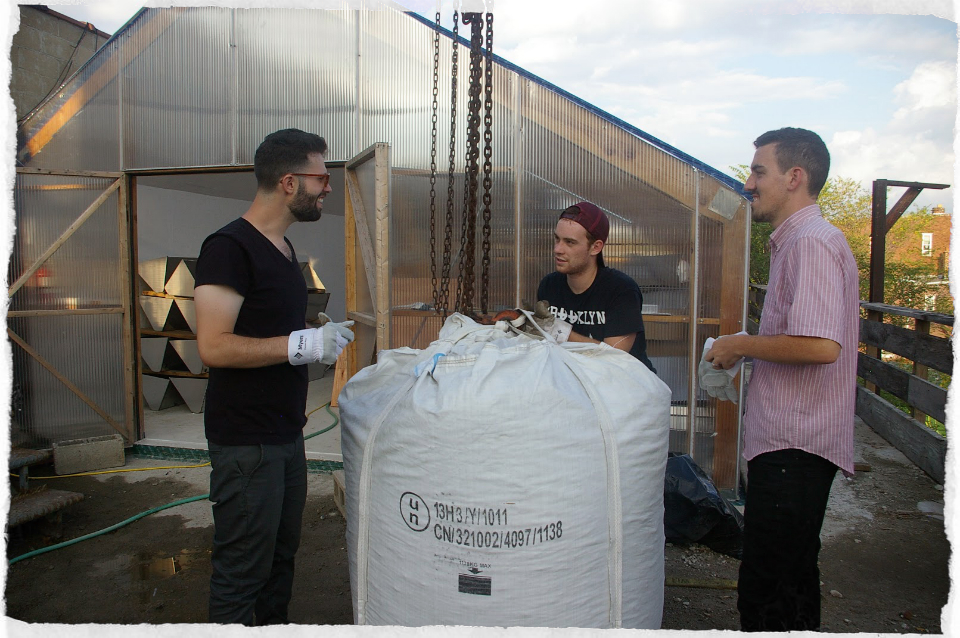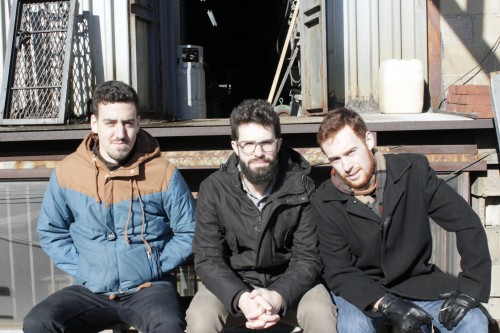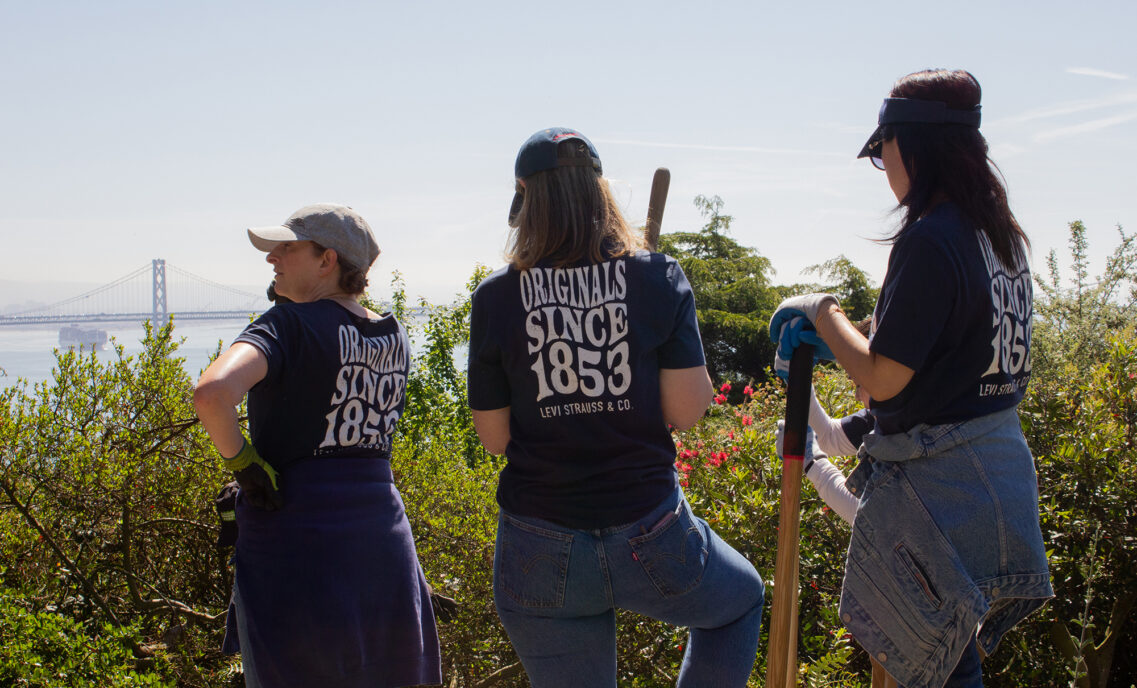Meet Ben Silverman and Jason Green, Founders of Edenworks
This is part of an ongoing series designed to feature people who are changing the world in their Levi’s®. Our Modern Day Pioneers are impacting everything from culture to social issues to the environment, and they’re challenging the status quo in a unique way. We hope these stories will inspire and empower you to live your life to its fullest in Levi’s. Have someone we should consider? Email us! Follow the Modern Day Pioneers series here.
Edenworks is setting out to revolutionize the way we cultivate and interact with our food. The fledgling startup, based out of Brooklyn, has its sights set on revolutionizing food farming through the use of aquaponics, data science and vertical design. By using computing technology to measure the data of plants and seafood farmed in a sustainable closed environment, Edenworks is foraying into the future of food production. The result? Food farmed sustainably, with innovation at its core.
Here at Levi Strauss & Co., sustainability and innovation are in our jeans and we couldn’t be more excited to feature Edenworks in our Modern Pioneers series. We asked Edenworks’ Jason Green, CEO and Founder and Ben Silverman, Chief Design Officer and Co-Founder—both longtime Levi’s enthusiasts—to tell us about Edenworks and the work they get done in their favorite pair of jeans:
What are you currently working on?
BEN SILVERMAN: I am working on designing the second version of the Edenworks integrated greenhouse and farming system. Taking all of the lessons learned from constructing my original design with our own hands, I am working on designing a greenhouse for easier assembly and more efficient material use. We have installed sensors to monitor everything from water chemistry to ambient air temperature and humidity. As we learn from the data, these lessons will be reflected in our future design. In this manner, each farm will be more efficient in construction, operation and yield than the previous.
JASON GREEN: Edenworks at large is working on bringing our Farmlab online. The Farmlab is basically a 1,000 sq ft prototype of our intelligent vertical farming system. As the CEO of Edenworks, my focus is on finding the critical path from where we are now to where we need to be in order to actualize our grand vision. That is, my job is to figure out how we take the proof of concept that we have in the Farmlab and turn that into a piece of building-integrated agricultural infrastructure to simultaneously manage food, water, air, energy, and waste. I think a lot about how we scale, who our customers will be at different stages, what technology and solutions we’ll need to add value for our customers, and how we finance and generate revenue as we grow.
How did you get to where you are today?
BEN SILVERMAN: I studied Architecture in school and then set out on working for as many different types of offices within the industry, to get the best understanding of what exactly I want to work on as well as understand the roles and be able to speak the language of every role in order to come up with innovative solutions. In addition, I never say no to a new project. There is always something to learn, and you never know who you’ll meet or where it will lead you. From working on an organic farm in North Carolina, to getting certified as a lumberjack, to taking a recommendation on having a drink with Jason, the Founder of Edenworks.
JASON GREEN: All of my past experiences, disparate as they’ve been, led me to Edenworks. For most of my life, I wanted to be a doctor. Then in college I started doing research at the nexus of bioengineering and neuroscience, building these wild virtual reality systems to rehabilitate people with brain-based mobility problems.
I realized at a certain point that medicine and academia were definitely not the right environments for me. I love to cook (and to eat, obviously) and was continually concerned about the specter of global climate change and its effect on our food supply. It was clear to me that little change was going to happen at the government or international level to address this impending extinction-level catastrophe—no hyperbole, we’re really headed in that direction unless we make some drastic changes globally. So I did a lot of reading, took MOOC courses on everything from environmental science to design, and started fleshing out this idea for scalable, intelligent, automated, vertical aquaponic farming.
I quit my job doing research at a medical school in January 2013, enrolled in some civil engineering courses to build up my infrastructure know-how, and started pitching my idea to everyone I could. I recruited my first cofounder, Matt, in February 2013 and then Ben in August. A year and a half later, here we are.
Edenworks founders Ben Silverman (left), Jason Green (middle), and Matt La Rosa (right)
What was your first Levi’s memory?
BEN SILVERMAN: I’ve been wearing Levi’s for over two decades now so it’s a bit hard to think that far back. I do remember coming back home from college once to see some friends and one of them was amazed at how worn in and comfortable my jeans looked. They figured I had purchased a fancy pair of pre-worn jeans for a couple hundred bucks. In actuality, it was just a pair of Levi’s that I wore almost everyday and probably only washed when I occasionally visited home and had a free washing machine to use. That’s when I realized I could get away without washing them and no longer felt any shame for wearing the same jeans every other (if not everyday).
JASON GREEN: I guess my story is pretty similar to Ben’s…I’ve always worn denim, Levi’s especially. Over the last few years, I’ve done a lot of traveling. When I first started exploring, I had this habit of over-packing, but my extra pants seldom made it out of my suitcase/backpack. I’ve since learned: there really is no better traveling companion than a good pair of jeans and boots. I’ve done a few crazy trips between opposing climates—a depth of winter trek from eastern Europe to the sweltering heat of the Middle East, another took me up through Scandinavia to the arctic circle then down to southern Spain—and while shirts, jackets, gloves, hats, and layers of thermal undergarments may have come and gone, my Levi’s and boots soldiered on.
What are you likely to be doing in your Levi’s?
BEN SILVERMAN: I pretty much wear them all the time, so I could be doing anything. I prefer black Levi’s because I can go from being on a construction site for work to tucking my shirt in and heading to a business meet with just a quick dusting off. Or go from stone carving (my main hobby outside of work and friends) straight to a bar.
JASON GREEN: A better question might be what am I not doing in my Levi’s (mostly, the answer is sleeping, but there are exceptions to that, too). Already today I’ve been downstairs to our fabrication shop and our greenhouse, climbed to the top of the greenhouse to help with assembly, jumped in on some welding and carpentry, now I’m working at my standing desk in whatever the urban farming version of the company “suit” is. I consider going to a meeting with a little rust on my pants a badge of honor.
What legacy do you hope to leave in the world?
BEN SILVERMAN: An improvement on the status quo of industrial agriculture and the sustainability of urban living.
JASON GREEN: I hope to leave a legacy of conscious action. The particular cause that I’ve dedicated my life to so far is stewardship of our environment and our species, and, before it’s too late, to create a global consciousness of humans as a part of a larger global ecosystem. I think people forget that the Earth isn’t required or compelled to nurture us; we’re animals living in a tiny biome on a rock hurtling through the vastness of space. When I think in those terms, I realize how delicate our existence is, and I am drawn to try to protect it. I’ll spend the rest of my life trying to spread that consciousness and encouraging responsible change.








